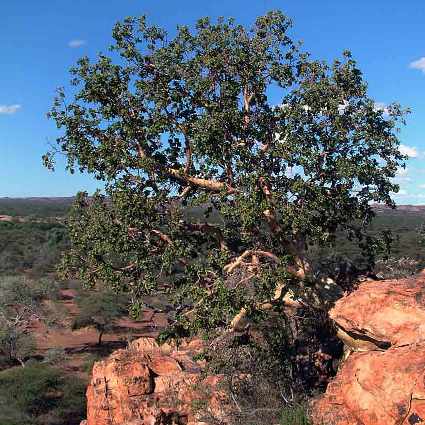20 Ficus tettensis Seeds - Small Leaved Rock Fig Tree - Indigenous to South Africa
Check my rate
| Main centres: | 1-3 business days |
| Regional areas: | 3-4 business days |
| Remote areas: | 3-5 business days |
Product information
Common Name: Small Leaved Rock Fig
Ficus is a genus of about 850 species of woody trees, shrubs, vines, epiphytes, and hemiepiphyte in the family Moraceae. Collectively known as fig trees or figs, they are native throughout the tropics with a few species extending into the semi-warm temperate zone. The so-called Common Fig (F. carica) is a temperate species from the Middle East and eastern Europe (mostly Ukraine), which has been widely cultivated from ancient times for its fruit, also referred to as figs. The fruit of most other species are also edible though they are usually of only local economic importance or eaten as bushfood. However, they are extremely important food resources for wildlife. Figs are also of paramount cultural importance throughout the tropics, both as objects of worship and for their many practical uses.
The specific identification of many of the species can be difficult, but figs as a group are relatively easy to recognize. Many have aerial roots and a distinctive shape or habit, and their fruits distinguish them from other plants. The fig fruit is an enclosed inflorescence, sometimes referred to as a syconium, an urn-like structure lined on the inside with the fig's tiny flowers. The unique fig pollination system, involving tiny, highly specific wasps, known as fig wasps that enter these closed inflorescences to both pollinate and lay their own eggs, has been a constant source of inspiration and wonder to biologists. Finally, there are three vegetative traits that together are unique to figs. All figs possess a white to yellowish sap (latex), some in copious quantities; the twig has paired stipules or a circular stipule scar if the stipules have fallen off; and the lateral veins at the base of the leaf are steep, forming a tighter angle with the midrib than the other lateral veins, a feature referred to as a "tri-veined". There are no unambiguous older fossils of Ficus. However, current molecular clock estimates indicate that Ficus is a relatively ancient genus being at least 60 million years old, and possibly as old as 80 million years. The main radiation of extant species, however, may have taken place more recently, between 20 and 40 million years ago. Ficus tettensis or Small leaved rock fig as it is commonly known is a rock splitting tree that can attain 12m in height. It has beautiful pale cream bark and almost round pale green leaves and hairy figs that are borne in leaf axils. You're buying a pack of 20 Seeds We'll supply you with all the germination and care instructions. |



 Ficus is a pan-tropical genus of trees, shrubs and vines occupying a wide variety of ecological niches; most are evergreen, but some deciduous species are endemic to areas outside of the tropics and to higher elevations. Fig species are characterized by their unique inflorescence and distinctive pollination syndrome, which utilizes wasp species belonging to the Agaonidae family for pollination.
Ficus is a pan-tropical genus of trees, shrubs and vines occupying a wide variety of ecological niches; most are evergreen, but some deciduous species are endemic to areas outside of the tropics and to higher elevations. Fig species are characterized by their unique inflorescence and distinctive pollination syndrome, which utilizes wasp species belonging to the Agaonidae family for pollination.
